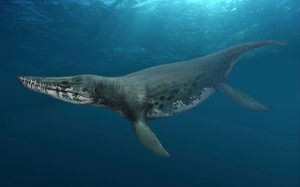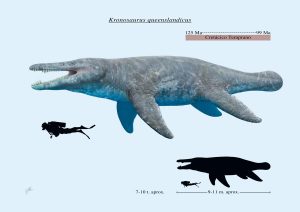Prehistoric crocodile fossil, Kronosaurus queenslandicus, believed to have lived in Australia’s great inland sea some 110 million years ago

A world-famous specimen of a prehistoric marine reptile named after Queensland has sat at Harvard University in the United States for about 90 years.

Central Queensland fossil education guide and enthusiast Phil Hore would like to see the world’s only mounted Kronosaurus queenslandicus returned to the state.
The species lived between 120 to 200 million years ago and belongs to an extinct group of reptiles known as plesiosaurs, with the last dying in a mass extinction event with dinosaurs.

Mr Hore said he believed the Harvard fossil was “one of the biggest ones ever found”.
“The closest thing would be maybe if you think of a crocodile with flippers, that is as big as a sperm whale and with the head the size of basically a small truck,” he said.

“I’ve never understood why Queensland hasn’t … tried to actually get it back from Harvard.”
But Queensland Museum palaeontologist Espen Knutsen said the specimen was “scientifically useless” and it would be better for researchers to hunt for new specimens in western parts of the state.
![]()
“Harvard dug out a couple Kronosaurus specimens and took them back to Harvard in America and they sat there for a few decades before some amateur came along who was interested in seeing it restored,” he said.
Dr Knutsen says there is limited information on Harvard’s specimen because reconstruction commonly used at the time makes it difficult to study.(Supplied: Espen Knutsen)
He said while it was difficult to estimate the size of the creature with only partial skeletons, some natural samples were about 10 metres long.
Teeth and lower jaw of a Kronosaurus, Queensland’s largest fossil predator, at the Queensland Museum.(ABC Radio Brisbane: Jacob Roebuck)
Experts say the Harvard specimen, pictured, is exaggerated.(Commons: Tim Sackton)
Director Gonzalo Giribet said the fossil was purchased from the McNamara family in Queensland.
Visitors are welcomed to Richmond by this replica of a Kronosaurus at Kronosaurus Korner.(ABC North West Qld: Kathleen Calderwood)
“It was given in good faith at the time, nobody else wanted it, and they’ve done years and years of prep work [on the fossil] that comes at a great cost.”
Founder of Kronosaurus Korner Rob Ievers has assisted with fossil digs. (Supplied: Kronosaurus Korner)
“It’s not everyday that you stumble across a fossil of Kronosaurus. You have to be extremely lucky,” he said.
The Kronosaurus Korner museum’s plesiosaur specimen was discovered in 1989.(Supplied: Kronosaurus Korner)